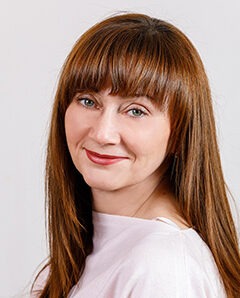PLO 1. Conduct a nursing subjective and objective examination of various organs and systems of the patient and evaluate the obtained data.
In the conditions of health care facilities and at home, by communicating with patients of different ages, their relatives or close friends, a sick child and his parents, be able to collect complaints, disease history, life history, allergic history, epidemiological history, evaluate anamnestic data.
PLO 2. Conduct nursing diagnosis: identify and assess patient problems.
In the conditions of health care facilities, at home, predictable circumstances, to be able to identify the real problems of the patient, assess their priority and establish a nursing diagnosis.
PLO 3. Plan nursing interventions.
In the conditions of health care facilities, at home and under unforeseen circumstances, be able to make a plan of nursing interventions to solve real and related problems of patients of various ages.
PLO 4. Monitor the work of junior medical staff and the state of inventory.
In the conditions of health care facilities, in accordance with job duties, in order to comply with the sanitary and anti-epidemic regime, be able to:
- Conduct training of junior medical personnel on the performance of functional duties and occupational health and safety; monitor compliance with safety rules by junior medical personnel.
- Monitor the work of junior medical staff; control the implementation of the rules of the internal procedure by staff and patients; monitor compliance with measures of sanitary and hygienic regime in wards and medical offices.
PLO 5. Execute nursing administration.
In the conditions of health care facilities, in order to implement organizational and management competencies, to be able to:
- make management decisions, ensure their implementation based on the application of nursing management models;
- ensure the implementation of orders and resolutions on health care issues;
- master the functional duties of the head of nursing services;
- know the procedure for licensing and accreditation of medical and preventive facilities, laboratories of various profiles, etc.
PLO 6. To ensure a healthy microclimate in the team, using the principles of nursing ethics and deontology, the rules of interpersonal communication in order to create a favorable psychological microclimate, to be able to:
- communicate with the patient and members of his family or close friends, medical staff;
- to solve ethical and deontological problems in the process of working with the patient and his family members; consider and analyze professional mistakes in the team; conduct training for junior and technical personnel.
PLO 7. To participate in the monitoring of healthy and sick population, rehabilitation and dispensary supervision.
In the conditions of health care facilities, at home and in the community, using the current orders of the Ministry of Health of Ukraine, in order to form, preserve and improve the health of the adult and child population, to be able to:
- keep records of dispensary population groups;
- to calculate and analyze statistical data of dispensation efficiency;
- conduct explanatory work among patients of different dispensary groups;
- keep records of health groups;
- calculate and evaluate individual indicators and indicators of the complex effect of the microclimate on the human body;
- to determine the stages of medical and social rehabilitation of the patient, tasks for each stage;
- make a complex of rehabilitation measures depending on the profile, course, period of the disease or injury;
- conduct a census of the child population.
PLO 8. To perform medical manipulations in order to ensure a sanitary and anti-epidemic regime.
PLO 9. Correctly perform medical manipulations in order to ensure the personal hygiene of the patient.
PLO 10. To perform the simplest methods of physiotherapy.
PLO 11. To coordinate activities using a combination of multiple skills to ensure patient nutrition.
PLO 12. Correctly perform medical manipulations in order to take measures to stabilize the functional state of the body.
PLO 13. To prescribe, store and apply pharmacological agents.
PLO 14. Be able to prepare the patient, collect and send biological material for laboratory and instrumental examinations.
PLO 15. To provide an emergency medical care based on the diagnosis of an emergency.
PLO 16. The ability to be accurate in performing interdependent nursing functions.
PLO 17. To plan and execute a preventive and an anti-epidemic measures for infectious diseases.
PLO 18. To organize and conduct training of patients and their family members on medical issues.
PLO 19. To conduct medical and hygienic propaganda.
PLO 20. Properly maintain appropriate medical records.

